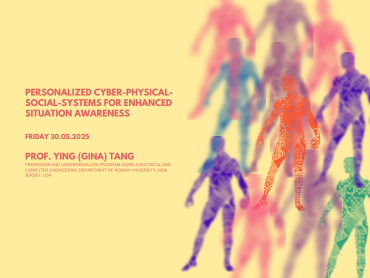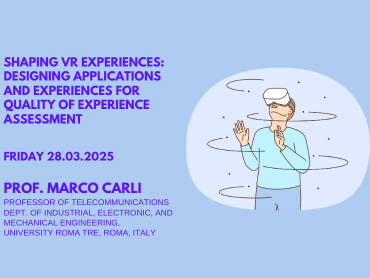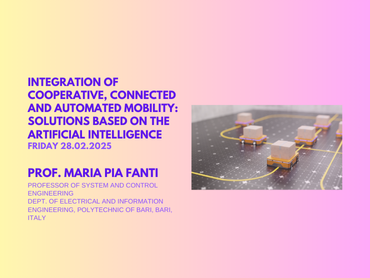SMC Italy Chapter Seminar Series
Each year the SMC Italy Chapter organizes a series of Seminars open to all interested audience.
- When: once per month on Friday afternoon.
- Where: online.
- Who: the speakers of the seminars are eminent Professors from all the world.
- Topics: a wide variety of topics is included regarding the IEEE SMC Society aims and scopes.
Lecture 4 – 30.05.2025 – Prof. Ying (Gina) Tang – Rowan University
Recording of the lecture available here.
 Abstract:
Abstract:
With the emergence of cyber space, physical space, and social space, adaptive intelligence has become the key enabler of seamless integration across these domains, embodied in what are known as Cyber-Physical-Social Systems (CPSS). By personalizing the interactions between machine intelligence and human intelligence, CPSS can respond more effectively to the real-time needs of individuals and groups, presenting a wealth of potential for enhancing situation awareness across diverse fields. However, new challenges continue to arise in understanding and characterizing the intricate relations of machines, humans, and the natural world, all of which are vital for effective command and control. This talk will present perspectives of CPSS with the focus on solutions that address the dynamics of human interactions. Examples will include the use of AI-driven pedagogical agents in personalized learning environments and the visual analytic study of aviation safety data will be explored, highlighting how these systems can dynamically adapt to complex, data-rich environments for enhanced decision-making.
 Bio:Dr. Ying (Gina) Tang is the Professor and Undergraduate Program Chair, Electrical and Computer Engineering department of Rowan University, New Jersey, USA. Her research centers on cyber-physical-social intelligence (CPSI), with an emphasis on modeling and control for adaptation and personalization. Her work is supported by numerous federal agencies, such as National Science Foundation, US Army, Federal Aviation Administration, U.S. Environmental Protection Agency, as well as private foundations and industry partners. Dr. Tang holds three U.S. patents and has authored over 250 high-impact peer-reviewed publications. She is presently Senior Editor of IEEE Transactions on Systems, Man, and Cybernetics: Systems and IEEE Transactions on Intelligent Vehicles, and Associate Editor of IEEE Transactions on Computational Social Systems and Springer’s Discover Artificial Intelligence. Additionally, she is the Founding Chair of two IEEE Technical Committees on Intelligent Solutions to Human-aware Sustainability and Sustainable Production Automation. Dr. Tang was the recipient of numerous awards, including the 2024 Google Research Award, 2024 IEEE SMCS Outstanding Contribution Award, multiple Best Paper/Best Student Paper awards, the Most Active Technical Committee awards from IEEE SMCS (2021) and IEEE RAS (2020), Christian R. and Mary F. Lindback Minority Junior Faculty Award, and Charles A. and Anne Morrow Lindbergh Foundation Award.
Bio:Dr. Ying (Gina) Tang is the Professor and Undergraduate Program Chair, Electrical and Computer Engineering department of Rowan University, New Jersey, USA. Her research centers on cyber-physical-social intelligence (CPSI), with an emphasis on modeling and control for adaptation and personalization. Her work is supported by numerous federal agencies, such as National Science Foundation, US Army, Federal Aviation Administration, U.S. Environmental Protection Agency, as well as private foundations and industry partners. Dr. Tang holds three U.S. patents and has authored over 250 high-impact peer-reviewed publications. She is presently Senior Editor of IEEE Transactions on Systems, Man, and Cybernetics: Systems and IEEE Transactions on Intelligent Vehicles, and Associate Editor of IEEE Transactions on Computational Social Systems and Springer’s Discover Artificial Intelligence. Additionally, she is the Founding Chair of two IEEE Technical Committees on Intelligent Solutions to Human-aware Sustainability and Sustainable Production Automation. Dr. Tang was the recipient of numerous awards, including the 2024 Google Research Award, 2024 IEEE SMCS Outstanding Contribution Award, multiple Best Paper/Best Student Paper awards, the Most Active Technical Committee awards from IEEE SMCS (2021) and IEEE RAS (2020), Christian R. and Mary F. Lindback Minority Junior Faculty Award, and Charles A. and Anne Morrow Lindbergh Foundation Award.
Lecture 3 – 09.05.2025 – Prof. Tiago Cruz – University of Coimbra
Recording of the lecture available here.
 Abstract: Many Critical Infrastructures (CI) rely on Operational Technologies (OT) that were originally developed decades ago—an era when security concerns were minimal, and isolation was considered sufficient protection. Security was a distant afterthought, until problems started to appear.
Abstract: Many Critical Infrastructures (CI) rely on Operational Technologies (OT) that were originally developed decades ago—an era when security concerns were minimal, and isolation was considered sufficient protection. Security was a distant afterthought, until problems started to appear.
It took a series of incidents to shift this perspective. Over time, growing concerns from end-users, manufacturers, and regulatory bodies helped elevate security to a critical requirement, on equal footing with reliability and safety. Nevertheless, this trend has not evenly spread across the entire OT ecosystem – there is still much to be done, with legacy infrastructures being among the most worrying risks, albeit far from being the sole one.
This lecture will explore 15 years of collaborative research in CI protection, highlighting the joint efforts of Portuguese and Italian teams in addressing OT security needs, in many cases anticipating developments that later became mainstream. We’ll also reflect on how these outcomes have evolved and the enduring value of international cooperation in the face of growing cyber threats.
 Bio: Tiago Cruz is Associate Professor with Habilitation at the Department of Informatics Engineering of the University of Coimbra (Portugal) and Integrated Researcher at the Center for Informatics and Systems of the UC (CISUC), having started his research activity in 2001. His areas of expertise and research interests include (but are not restricted to) topics such as management systems for communication infrastructures and services (operator and data center environments), embedded computing, critical infrastructure security, IT security and data privacy, broadband access network device and infrastructure management, 5G, IoT and SDN/NFV, among others.
Bio: Tiago Cruz is Associate Professor with Habilitation at the Department of Informatics Engineering of the University of Coimbra (Portugal) and Integrated Researcher at the Center for Informatics and Systems of the UC (CISUC), having started his research activity in 2001. His areas of expertise and research interests include (but are not restricted to) topics such as management systems for communication infrastructures and services (operator and data center environments), embedded computing, critical infrastructure security, IT security and data privacy, broadband access network device and infrastructure management, 5G, IoT and SDN/NFV, among others.
He is the author of several publications, including book chapters, journal articles and conference articles. As part of its academic activity, he participated (with research and/or coordination functions) in various national and international projects financed by the EU and industry, related to areas such as critical infrastructure cybersecurity (CockpitCI FP7, ATENA H2020, Smart5GGrid P2020), 5G (Mobiwise and Mobilizador 5G P2020), autonomous infrastructure management (WEIRD FP6, ACROSS COST), content distribution networks (CONTENT FP6), U-Space Communications (SESAR JU BUBBLES) or privacy, blockchain and data protection (PoSeID-on H2020 IA), in partnership with telecommunications operators, industry partners and research agencies.
Lecture 2 – 28.03.2025 – Prof. Marco Carli – University Roma Tre
Recording of the lecture available here.

Abstract: In the evolving field of virtual reality (VR), the design of applications and immersive experiences that privilege user satisfaction is of high relevance. This talk provides an in-depth examination of the complexities involved in creating VR experiences, with a focus on the critical aspect of quality of experience (QoE) evaluation. State-of-the-art methodologies for evaluating QoE in VR environments will be explored, highlighting the importance of immersive design, user engagement, and technical performance. Participants will gain insights into best practices for creating VR applications that ensure a satisfactory user experience.
 Bio: Marco Carli is a Full Professor in the Department of Industrial, Electronic, and Mechanical Engineering at Università degli Studi ‘Roma TRE’, Italy. He holds a Laurea degree in Telecommunication Engineering from Università degli Studi di Roma ‘La Sapienza’ and a Ph.D. from Tampere University of Technology, Finland.
Bio: Marco Carli is a Full Professor in the Department of Industrial, Electronic, and Mechanical Engineering at Università degli Studi ‘Roma TRE’, Italy. He holds a Laurea degree in Telecommunication Engineering from Università degli Studi di Roma ‘La Sapienza’ and a Ph.D. from Tampere University of Technology, Finland.
He has served as a Visiting Researcher at the Image Processing Laboratory, UCSB, CA, and currently, he is a Senior Associate Editor for IEEE Transactions on Image Processing and Area Editor for Elsevier Signal Processing: Image Communication. An IEEE Senior Member, his research focuses on digital signal and image processing, with applications in multimedia communications, including digital watermarking, multimedia quality evaluation, and information security.
Lecture 1 – 28.02.2025 Prof. Maria Pia Fanti – Polytechnic of Bari
Recording of the lecture available here.
 Abstract: This talk will present some approaches developed to accelerate the integration of innovative Cooperative, Connected and Automated Mobility technologies and systems in terms of design and implementation of enhanced physical, digital and operational infrastructures. In particular, the talk will show some innovative techniques based on Artificial Intelligence for designing and applying traffic control methods such as signalized intersection management, route planning services and last mile delivery strategies. The used methodologies encompass global and distributed optimization, artificial intelligence techniques and simulation frameworks applied for a full integration of Cooperative, Connected and Automated Vehicles in the real traffic for transportation of both passengers and goods. The talk will also describe some recent results obtained in case studies by simulation environments and in the field.
Abstract: This talk will present some approaches developed to accelerate the integration of innovative Cooperative, Connected and Automated Mobility technologies and systems in terms of design and implementation of enhanced physical, digital and operational infrastructures. In particular, the talk will show some innovative techniques based on Artificial Intelligence for designing and applying traffic control methods such as signalized intersection management, route planning services and last mile delivery strategies. The used methodologies encompass global and distributed optimization, artificial intelligence techniques and simulation frameworks applied for a full integration of Cooperative, Connected and Automated Vehicles in the real traffic for transportation of both passengers and goods. The talk will also describe some recent results obtained in case studies by simulation environments and in the field.

 Bio: Maria Pia Fanti, IEEE Fellow, received the Laurea degree in electronic engineering from the University of Pisa, Pisa, Italy, in 1983. She was a visiting researcher at the Rensselaer Polytechnic Institute of Troy, New York, in 1999. Since 1983, she has been with the Department of Electrical and Information Engineering of the Polytechnic of Bari, Italy, where she is currently a Full Professor of system and control engineering and Chair of the Laboratory of Automation and Control.
Bio: Maria Pia Fanti, IEEE Fellow, received the Laurea degree in electronic engineering from the University of Pisa, Pisa, Italy, in 1983. She was a visiting researcher at the Rensselaer Polytechnic Institute of Troy, New York, in 1999. Since 1983, she has been with the Department of Electrical and Information Engineering of the Polytechnic of Bari, Italy, where she is currently a Full Professor of system and control engineering and Chair of the Laboratory of Automation and Control.